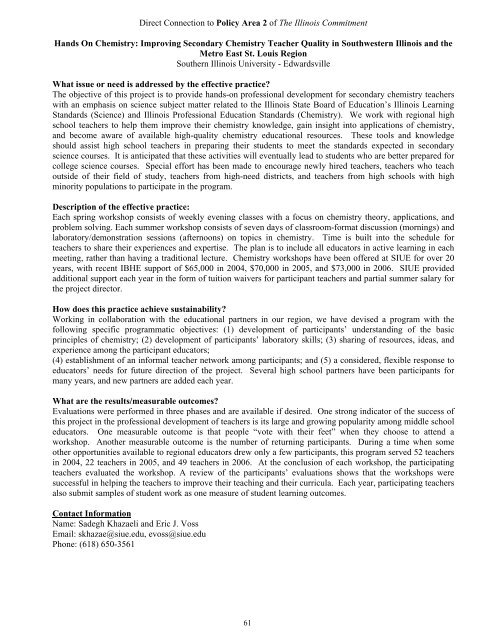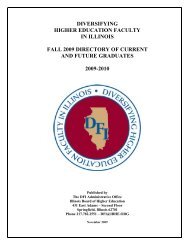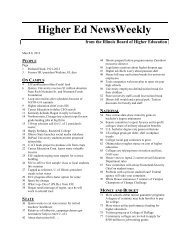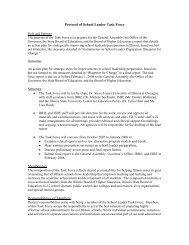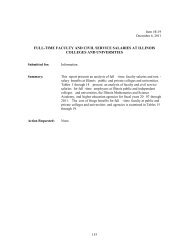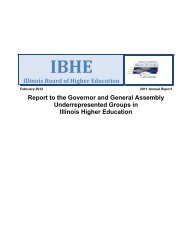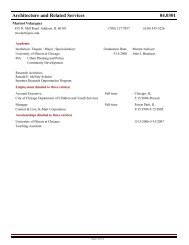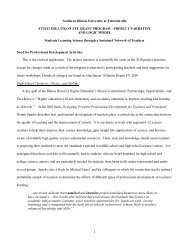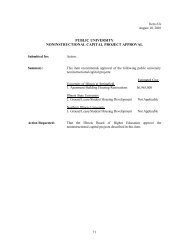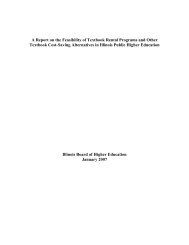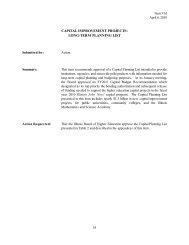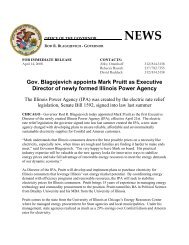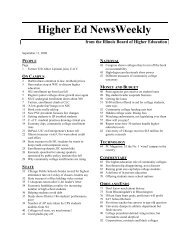Title of Effective Practice: - California Postsecondary Education ...
Title of Effective Practice: - California Postsecondary Education ...
Title of Effective Practice: - California Postsecondary Education ...
Create successful ePaper yourself
Turn your PDF publications into a flip-book with our unique Google optimized e-Paper software.
Direct Connection to Policy Area 2 <strong>of</strong> The Illinois Commitment<br />
Hands On Chemistry: Improving Secondary Chemistry Teacher Quality in Southwestern Illinois and the<br />
Metro East St. Louis Region<br />
Southern Illinois University - Edwardsville<br />
What issue or need is addressed by the effective practice?<br />
The objective <strong>of</strong> this project is to provide hands-on pr<strong>of</strong>essional development for secondary chemistry teachers<br />
with an emphasis on science subject matter related to the Illinois State Board <strong>of</strong> <strong>Education</strong>’s Illinois Learning<br />
Standards (Science) and Illinois Pr<strong>of</strong>essional <strong>Education</strong> Standards (Chemistry). We work with regional high<br />
school teachers to help them improve their chemistry knowledge, gain insight into applications <strong>of</strong> chemistry,<br />
and become aware <strong>of</strong> available high-quality chemistry educational resources. These tools and knowledge<br />
should assist high school teachers in preparing their students to meet the standards expected in secondary<br />
science courses. It is anticipated that these activities will eventually lead to students who are better prepared for<br />
college science courses. Special effort has been made to encourage newly hired teachers, teachers who teach<br />
outside <strong>of</strong> their field <strong>of</strong> study, teachers from high-need districts, and teachers from high schools with high<br />
minority populations to participate in the program.<br />
Description <strong>of</strong> the effective practice:<br />
Each spring workshop consists <strong>of</strong> weekly evening classes with a focus on chemistry theory, applications, and<br />
problem solving. Each summer workshop consists <strong>of</strong> seven days <strong>of</strong> classroom-format discussion (mornings) and<br />
laboratory/demonstration sessions (afternoons) on topics in chemistry. Time is built into the schedule for<br />
teachers to share their experiences and expertise. The plan is to include all educators in active learning in each<br />
meeting, rather than having a traditional lecture. Chemistry workshops have been <strong>of</strong>fered at SIUE for over 20<br />
years, with recent IBHE support <strong>of</strong> $65,000 in 2004, $70,000 in 2005, and $73,000 in 2006. SIUE provided<br />
additional support each year in the form <strong>of</strong> tuition waivers for participant teachers and partial summer salary for<br />
the project director.<br />
How does this practice achieve sustainability?<br />
Working in collaboration with the educational partners in our region, we have devised a program with the<br />
following specific programmatic objectives: (1) development <strong>of</strong> participants’ understanding <strong>of</strong> the basic<br />
principles <strong>of</strong> chemistry; (2) development <strong>of</strong> participants’ laboratory skills; (3) sharing <strong>of</strong> resources, ideas, and<br />
experience among the participant educators;<br />
(4) establishment <strong>of</strong> an informal teacher network among participants; and (5) a considered, flexible response to<br />
educators’ needs for future direction <strong>of</strong> the project. Several high school partners have been participants for<br />
many years, and new partners are added each year.<br />
What are the results/measurable outcomes?<br />
Evaluations were performed in three phases and are available if desired. One strong indicator <strong>of</strong> the success <strong>of</strong><br />
this project in the pr<strong>of</strong>essional development <strong>of</strong> teachers is its large and growing popularity among middle school<br />
educators. One measurable outcome is that people “vote with their feet” when they choose to attend a<br />
workshop. Another measurable outcome is the number <strong>of</strong> returning participants. During a time when some<br />
other opportunities available to regional educators drew only a few participants, this program served 52 teachers<br />
in 2004, 22 teachers in 2005, and 49 teachers in 2006. At the conclusion <strong>of</strong> each workshop, the participating<br />
teachers evaluated the workshop. A review <strong>of</strong> the participants’ evaluations shows that the workshops were<br />
successful in helping the teachers to improve their teaching and their curricula. Each year, participating teachers<br />
also submit samples <strong>of</strong> student work as one measure <strong>of</strong> student learning outcomes.<br />
Contact Information<br />
Name: Sadegh Khazaeli and Eric J. Voss<br />
Email: skhazae@siue.edu, evoss@siue.edu<br />
Phone: (618) 650-3561<br />
61


